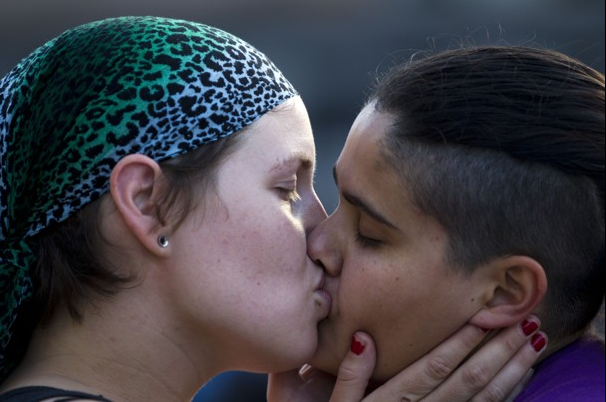Feature Image by Natacha Pisarenko. Via the Washington Post
While President Obama was evolving on gay rights, politicians in other countries were taking gay rights to the next level. In the last week, Chile, Argentina and Cuba have all seen monumental moments for equal rights. Maybe if Obama doesn’t win the next election, I’ll stop making half-hearted jokes about moving to Canada and actually relocate to Latin America.
+
Chile
Chile’s congress passed a new hate-crime bill 25-2. The bill, which is the country’s first to include protection for gay individuals, allows for anti-discrimination lawsuits and adds hate-crime sentences. Though held up in Chile’s Congress for seven years, efforts to pass the anti-discrimination law were refueled following the gay bashing and murder of Daniel Zamudio. Zamundio was attacked by neo-Nazi, specifically members of Nazis del Centro, who threw rocks and bottles at him, burned him with cigarettes and carved swastikas into the young gay man before he slipped in to a coma and died.
The law, which is now widely referred to as the Zamudio Law, defines discrimination as “distinction, exclusion or restriction that lacks reasonable justification” and protects against those targeted due to their “race, ethnicity, nationality, socioeconomic status, ideology, political opinion, religious beliefs, participation in organizations or lack thereof, sex, gender, sexual orientation, appearance, health and disabilities.”
From Gay Liberation and Integration Movement President Rolando Jimenez:
This is the beginning of the end for those who discriminate against sexual orientation, disability, ethnic origin and race. Today citizens have a judicial tool to defend themselves against discrimination. That is very good news. Starting today, Chile is a better place to live.
+
Argentina
Argentina made news Friday as it officially sits on top of the world of trans* rights. Previously being the first country in Latin America to legalize gay marriage, Argentina is now the first country in the world to allow individuals to change their legal gender, image and name without a judge’s or doctor’s approval. Additionally, children under 18 can legally change their gender with consent from their parents. Alternatively, parents cannot change their child’s legal gender without the child’s consent and a judge intervening to protect the child’s interest. In other words, Argentinean law now recognizes that it is not your body or actions that determine your gender, it’s how you personally identify.
The new law is critically important for individuals or can’t or don’t want to undergo costly surgeries or who haven’t been living as their true self for an extended period of time (as is often required for legal gender changes in other countries). Still, health insurance companies are now required to provide hormone treatment or surgery at no extra cost for those who seek it. “There’s a whole set of medical criteria that people have to meet to change their gender in the U.S., and meanwhile this gives the individual an extraordinary amount of authority for how they want to live” said Stanford University medical anthropologist and bioethicst Katrina Karkazis. “It’s really incredible.”
+
Cuba
During a Cuban gay pride parade in Havana, Mariela Castro announced that her father, President Raul Castro, supports gay rights and hopes to end gender/sexuality based discrimination. Though Mariela Castro is not queer, she has long advocated for gay rights and runs Cuba’s National Center for Sex Education. “[President Castro] has done some advocacy work, speaking of the need to make progress in terms of rights based on sexual orientation and gender identity,” said Mariela Castro. “He himself has said that… we cannot make progress if we continue to live with these prejudices.”
Historically, homosexuality was stigmatized and criminalized in Cuba. Members of the LGBTQ community were interned in forced labor camps during the 60s and 70s, public homosexual displays of affection were illegal until 1979, and the government cracked down on LGBT groups and individuals during the late 90s and early 2000s. Still, gay rights appear to be improving in Cuba. In 2010, Cuban government legalized gender reassignment surgery and included it in the state-sponsored healthcare. That same year, Fidel Castro called pursecution of homosexuals under his regime “a great injustice, great injustice” and took responsibility for allowing it to occur.
In many ways, Mariela Castro’s comments seem to be part of a growing trend towards gay rights in Cuba. Her comments follow a January resolution by Cuba’s Communist Party Congress “to fight against all forms of discrimination, including against sexual discrimination, and discrimination on the basis of sexual orientation and sexual identity.” Mariela Castro even indicated that President Raul Castro, while against gay marriage, might find support for civil unions. “The Cuban president… has been talking about this issue, but he has not made it public,” she said. “It is surely part of his strategy.” Unfortunately, as Cuba remains a country where protest is illegal, equality will only be realized if President Raul Castro does decide that gay rights are in his strategy.







